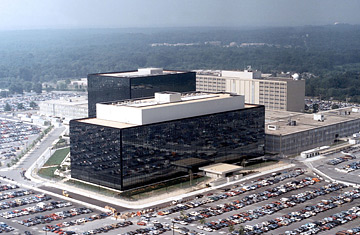
National Security Agency headquarters in Fort Meade, Maryland.
By most appearances, President Bush scored a rare and much sought-after victory last weekend. After months of tough negotiations, the Democrats caved to Bush's demands for new authority to conduct warrant-free eavesdropping in the United States. But on one key issue that the new bill was supposed to address — the increasing wariness of telecommunications companies when cooperating with the government eavesdropping program — Bush's victory was more political than it was substantive.
On paper, the bill does give Bush much of what he wanted, including the authority to listen in on conversations between foreigners and Americans without getting permission from a secret intelligence court. But in practice telecoms are still skittish about their role in the intelligence gathering, and that could hamper the Administration's ongoing efforts. Bush tried and failed to get retroactive immunity for the telecoms' cooperation with the warrant-free program since 9/11, something the industry has lobbied hard for in the past three months. And he also failed to get the blanket immunity the telecoms were seeking for future cooperation. As cases brought against the telecoms for their cooperation in the program move ahead in the courts over the coming weeks, pressure will quickly resurface on Bush to go back to the Hill for another fix.
The key private sector players are AT&T and Verizon, both of which are being sued in California by activist groups for intercepting and providing to the government private communications of Americans. Sources close to the matter say that because of those cases, and because of the publicity surrounding the eavesdropping programs, the telecoms have grown increasingly wary of cooperating with the government on warrant-free domestic surveillance. "There are times when [the Administration] doesn't get the degree of cooperation they need and can't move at the speed they think they need," says one lawyer familiar with the matter. "Those are the kinds of things that frustrated them."
In response to that hesitancy, Bush tried to get unconditional immunity for the companies from Congress. Democrats, unwilling to undermine cases that could bring to light details of what they believe is illegal government surveillance, offered a compromise. They would include blanket immunity for the telecoms if the government would agree to assume any liability in cases brought against the companies. The Administration rejected that compromise, a source close to the discussions says.
In the end, the Democrats did agree to limited immunity: the bill provides it to companies that comply with a government eavesdropping warrant in the future. However it does not protect the companies for complying with the warrant-free program at the heart of the controversy. Nor does it cover them for past compliance either. "The bill doesn't have much impact on the legal issues," faced by the companies, says a source familiar with the matter. AT&T and Verizon both declined to comment on the substance of the cases.
The question will surface in coming weeks as lawyers for the government, the telecommunications companies and activist organizations face off in a California court. Next Wednesday, the Ninth Circuit Court of Appeals will hear oral arguments as the government seeks to dismiss a case brought by the Electronic Frontier Foundation and others claiming AT&T illegally intercepted and provided to the government calls and e-mails of Americans. The government is arguing that the case can't be tried without divulging important state secrets. EFF says the telecoms violated a variety of laws guaranteeing Americans protection from eavesdropping. On Aug. 30, the northern district of California will hear a similar set of consolidated cases against the telecoms.
Bush is already saying he will go back up the Hill on the issue as early as September. After signing the bill last Sunday, he issued a statement saying, "When Congress returns in September the Intelligence committees and leaders in both parties will need to complete work on the comprehensive reforms requested by Director McConnell, including the important issue of providing meaningful liability protection to those who are alleged to have assisted our nation following the attacks of September 11, 2001."
